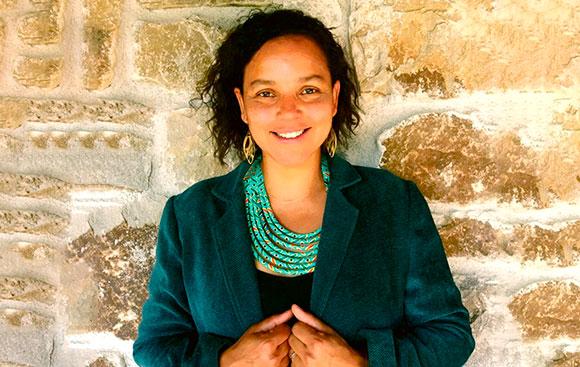
Marcelle Mardon, a Zimbabwean architect who represents the Dialogue on Shelter organisation
“We work to get basic services from a gender point of view”
The platform creates savings cooperatives amongst women from the slums of Masvingo, Zimbabwe, to empower them and to build basic infrastructures.
Marcelle Mardon is a Zimbabwean architect and town planner with over 20 years of experience, committed to women’s rights in urban environments. She forms part of the MIT SIS of the Massachusetts Institute of Technology, a group of multidisciplinary investigators devoted to researching and defending slums in southern countries. In recent years she has been working in Bilbao, representing the Dialogue on Shelter organisation, in order to obtain funds for projects in Africa.
What is Dialogue on Shelter?
It is a non-governmental organisation of town planners and architects that acts as a bridge between the institutions that make policies about how cities should be and the community-based organisations of people who live in the slums. These are vulnerable people who are trying to come together and take action in order to achieve improvements or to become agents for change for their own well-being. We work to get very basic services, from a gender point of view.
You are now in the city of Masvingo (Zimbabwe). What are you doing there?
In 2050, 68% of the world population will live in cities. This will also be the case in Africa. Additionally, Africa is the continent where the cities and the population are growing most. Today, more and more people are coming to the large cities and the infrastructures cannot adapt to this. In these countries, the urban plans and the planning policies of the cities remain the same as they were during the colonial period, and the slums that have been growing up in reality do not exist on paper. We cannot have so many people living in places that are not officially considered as areas developed for urbanism. Another problem is poverty, specifically in Zimbabwe many people have to leave the centre of the city to find a cheaper place to sleep.
How do you work?
Dialogue on Shelter is an organisation that supports the Zimbabwe Homeless People’s Federation and we use a methodology developed in India under an umbrella entity called Slum Dwellers International. There are other people in Africa working with the same method and we act as a network, learning from each other. We focus on women’s empowerment, using savings groups led by women in order to put them at the centre of everything. The groups meet up every week and the women decide on the priorities for their needs. They save money to be able to improve the infrastructures of their districts and we talk to the institutions in order for them to realise that it is a good idea to improve these districts, working together. That is to say, we look for funding through savings cooperatives and town councils. If the councils have no money, they collaborate with permits, land, technical knowledge or whatever they can. Additionally, we work learning in a network and the cities that have developed initiatives that work come to visit us or we go there with representatives from the institutions to show them what they can do in their own cities.
Thanks to the project we are collaborating on with the Bilbao City Council, we will reach over 20,000 people in two communities
How is Bilbao City Council collaborating with you?
Over the past four years in Bilbao, we have received frunding from the City Council and we have started a dialgue between the community and the council to organise a strategy in Masvingo.
Does the key lie in work in the community?
Our basic principles are very similar to those used in cooperatives. We have federations that involve different groups that we bring together to carry out actions and to be able to do more things: we support the creation of businesses; we install improvements in water supply piping, sewage or accommodation. Everything that is necessary for living decently. The actions also go beyond the members of the federations and affect the district in general. Thanks to the project we are collaborating with the Bilbao City Council, we will reach over 20,000 people from two communities.
What are the advantages of working with women?
Women handle money better and when they control it, we generate a situation of equality in the communities. The groups go further than just saving money, the women learn about leadership, accounting, how to do business or acquiring the skills needed to dialogue with the institutions. In the end, they obtain the ownership of the land, which is the main objective, ensuring that they can sign and put their names on the contracts, because generally, this is not the case: in traditional families the man holds the leading role. There are other reasons for working with the women and the fact is that there are a large percentage of women who live in cities and who are the heads of the family. AIDS caused havoc in Zimbabwe and there are many women on their own. Additionally, there are an increasing amount of single women who come to the cities to escape restricting traditions or to look for work.
What have you achieved with your work in Masvingo?
Thanks to the collaboration with Bilbao we have carried out some preliminary water and sewage projects. We have also taken professionals from the University to Masvingo to start designing improvements in the homes. Every year we have taken a new step towards improving the slums. Now we are already talking about the city’s overall future, because these poorest communities also form an important part in the development and planning of the cities. And we are doing this through platforms formed by representatives of all the agents: institutions, NGOs, associations and representatives from these communities.
What are the basic deficiencies?
Above all, the sewage network. There is just one lavatory for 50 people and this is terrible, particularly for the women and children. Often they have to go to the bathroom at night with their mobile telephone as there is no light or at times they are attacked. I think that it is important that we have managed to introduce this gender view and open up this discourse regarding planning aimed specifically at women.
Is it important to include the gender component in town planning?
Without any doubt. It is to ensure that the women can make decisions about their own specific needs and those of their daughters in their own environment, needs, which in general are not even considered. You have to talk to them to find out what is happening: that the water is too far away, the lavatories, which are very dirty, that there is little water and they have to get up at four o’clock in the morning… If you don’t talk to them about the challenges that these women face and they have no voice, we will continue to design things in the same way as before, on a city scale, because we are not talking about disperse pilot schemes, but rather an overall strategy that is going to benefit everyone.



